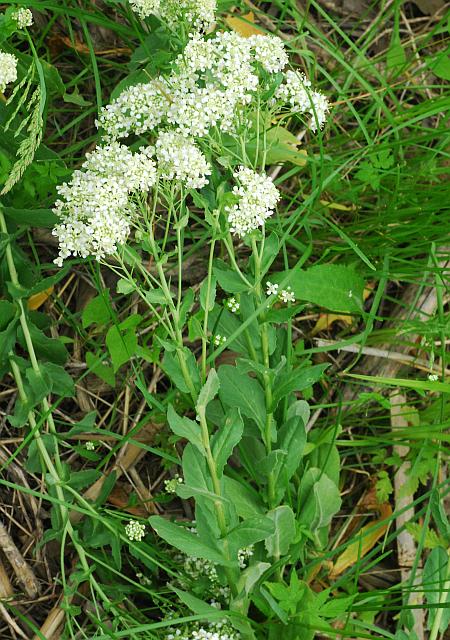Lepidium chalepense L.
Lens-Podded Hoary Cress

Introduced
CC = *
CW = 5
MOC = 8
© SRTurner
Lepidium chalepense L.Lens-Podded Hoary Cress | |
 |
Introduced CC = * CW = 5 MOC = 8 |
© SRTurner |
|
Family - Brassicaceae Habit - Perennial forb with long-creeping, branched rhizomes, often forming dense colonies. Stems - Erect, densely short-hairy.
Leaf - Densely short-hairy. Lower leaves petiolate. Upper leaves clasping stem, auriculate, ovate to oblanceolate, coarsely and irregularly toothed.
Inflorescence - Flat-topped panicles.
Flowers - Petals white, 2.5-4.5 mm long, exceeding sepals. Stamens 6. Styles 1.0-1.8 mm long.
Fruits - On 5-10 mm stalks, 3.0-5.5 mm in diameter, slightly flattened to inflated, rounded to truncate at base, glabrous, unwinged.
Flowering - April - July. Habitat - Roadsides, open, disturbed areas. Origin - Native to Eurasia, widely introduced in U.S. Lookalikes - L. draba, L. campestre, Thlaspi arvense. Other info. - This species is probably uncommon in Missouri, with known populations restricted to a few sporadic locations on the eastern and western edges of the state, though it may be increasing in abundance. It is much more common in the western third of the continental U.S. The plant is similar in appearance to L. draba, which has fruits which are more flattened and cordate at the base. These plants can form dense rhizomatous colonies, conspicuous in flower with shining white inflorescences. The hoary cresses are considered pests in some western states. Photographs taken near West Alton, St. Charles County, MO, 4-29-2016, near Labadie, Franklin County, MO, 4-19-2017, and along the Katy Trail near Treloar, Warren County, MO, 5-2-2020 (SRTurner). |